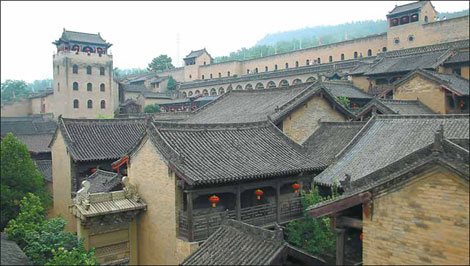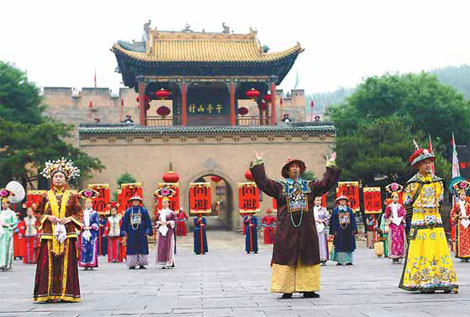
 |
|
Chancellor Chen Tingjing Mansion in Yangcheng county is one of the most popular historical attractions in Shanxi province. Photos by Zou Hong / China Daily |
 |
|
Villagers stage a show about the Kangxi Emperor's visit to the home of former chancellor Chen Tingjing. |
Related: A village's window of opportunity
From being a sleepy village, Huangcheng is fast becoming a tourism hotspot. Chen Nan reports in Shanxi province.
Visitors to Huangcheng village more than a decade ago would not recognize it today. "The roads were narrow and dirty. The air was thick with dust. During rainy days, the roads turned into mud," recalls Zhang Jiasheng, 56, the head of Huangcheng village in Yangcheng county, Shanxi province. "It felt hopeless."
But during the recent May 1 holiday period of three days, more than 200,000 tourists visited the village, drawn by Chancellor Chen Tingjing Mansion. Chen was a royal tutor for 53 years during the Qing Dynasty (1368-1644).
Developing the site was Zhang's brainchild.
"We have inherited such a huge blessing from our ancestors and so I thought why don't we use it to generate wealth for the village?" Zhang says.
Work on the historic site started in 1998, helped by a 100 million yuan ($15.7 million) investment.
With a history of over 500 years, the mansion covers 100,000 square meters and has 19 gardens and yards, in addition to 640 rooms. The walls surrounding the compound are 1,700 meters long and 12 meters high.
Chen's uncle, Chen Changyang, designed the inner dwellings of the mansion in 1633. In 1703, Chen added more buildings within the compound.
Legend has it that Emperor Kangxi (1622-1723) stayed in the mansion twice, thus earning it the name Huangcheng (Emperor City).
Villagers also used to live in the mansion and when Zhang mooted the idea to develop the historical site, they refused to move out.
Many villagers didn't believe that tourism could bring wealth, Zhang says.
As an incentive, Zhang founded Huangcheng Xiangfu Group, in 2003, to offer tourism-related job opportunities for the villagers.
"As time goes by, more tourists came and the villagers' attitudes began to change," he says.
In 2011, the group recorded more than 3 billion yuan in revenue, among which tourism brought in 350 million yuan.
Out of the 680 people living in Huangcheng village, some 90 percent are involved in tourism-related work such as hotels, restaurants and souvenir shops.
There is a distinct feature in Huangcheng compared to other tourist destinations - vendors do not pressurize visitors to buy things.
Zhang attributes this to the wealth brought by coal mining for more than 10 years before the village started developing tourism.
"As a tourist walking around the historic site, I feel relaxed and free to soak in the sights," says Jin Hua, who was visiting Huangcheng with her family. "The vendors didn't push their products on me. In fact, they chatted with me about the place and made me feel at home."
To enrich the tourist experience, villagers have been organized to stage shows. For example, they play Ba Yin Hui (Eight Instruments Concert) at 10:30 am daily.
Tourists can also visit a museum displaying the various editions of classical dictionaries, as former chancellor Chen Tingjing was the editor of the Kangxi dictionary.
"Tourism has changed the lives of the villagers and their conservative attitudes. Now, people think of ideas to help develop tourism in the village," says Cheng Peng, who migrated to Huangcheng village four years ago from a nearby suburb. "Thousands of people from nearby villages are now working here."
He says that villagers are happy that their quality of life has improved. Huangcheng Xiangfu Group even pays for the education of young villagers, be it in other cities within China or overseas.
Zhang was elected as the deputy of the National People's Congress in 2010, and additionally started studying marketing and management at a university in Taiyuan, Shanxi province. On behalf of the village, he has also invested in a movie company to produce a 3D movie.
But Zhang says the top priority of the village is protecting the historic site and avoiding over-development, adding that Huangcheng Xiangfu Group has hired a professional team to do the job. They have also invested heavily in environmental protection.
"The villagers have witnessed the place's transformation and feel a strong responsibility to protect their home because they have a deep connection with everything in the village," Zhang says.